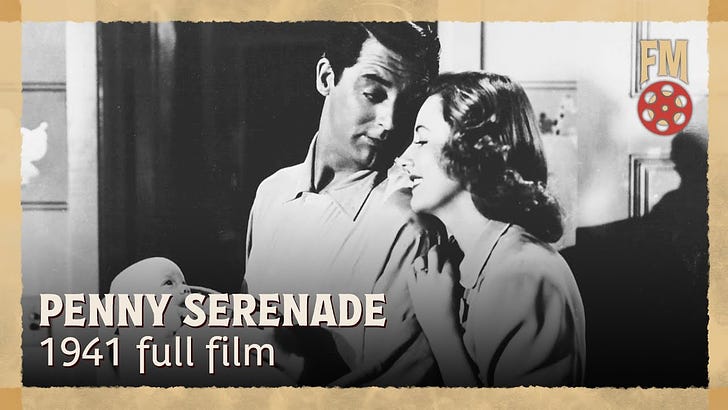“We don’t need each other anymore,” says Julie Adams (Irene Dunne) to Applejack, a true friend to her and her husband Roger (Cary Grant). He has placed a record on the Victrola, with the song, “You Were Meant for Me.” But she tells him to turn it off. Julie is apparently drained of all feeling. “When that happens to two people,” she says, “there isn’t anything left.”
So she sends Applejack away. But when he is gone, she turns to the phonograph again, and plays the record – and that brings back the memory of when she and her husband Roger met for the first time. It continues that way through the film, with Julie playing one record after another, because they have all been saved in a kind of phonograph scrapbook, under the title, “The Story of a Happy Marriage,” with pictures in it, and items that loving parents save – even a little diaper. And the film, till near the end, is just the series of her reminiscences, which we see as if they were happening live, right now. But we see them also through her eyes, sad, resigned, as if it were all in vain.
Advent is here, and so are our Christmas offers at Word & Song!
The voices of the past come back to Julie. They come back to us too. When she and Roger met, they fell in love at first sight, married on impulse, and went all the way from New York to San Francisco to Tokyo, where he would be working as a news reporter. Julie was carrying their first child, when the great earthquake struck Tokyo, and not only did she lose the child; she could never have another. “The Japanese Sandman” brings that time of joy and sadness back to her — and the song ends, as the time in Japan ended too. She and Roger return to America, where he takes up the reins of a small-town newspaper always on the edge of collapse. That’s when Applejack (Edgar Buchanan) shows up, an old hand at the linotype machine and the presses, to help out, and when, struggling to prove themselves financially stable enough to adopt a child, Julie and Roger get a baby girl from the adoption agency. They name her Trina. Life goes on — or, as Job would say, “Man that is born of woman is of few days, and full of trouble.”
If you asked us – my family – to name a film most dedicated to the goodness and holiness of marriage, Penny Serenade might be our choice. The acting is flawless. You will expect it to be so, given Cary Grant and Irene Dunne in the lead roles, but also crucial to the film are the fine and understated supporting characters, Beulah Bondi as the kindly head of the local adoption agency, and Buchanan (old Uncle Joe Carson on the pleasant comedy Petticoat Junction) as Applejack. The Adamses devote themselves utterly to Trina, even as Roger can hardly hold his head above water, financially. One of the tenderest scenes in American film – but also understated – comes when Julie has to give the baby a bath and doesn’t know how, and begins to doubt whether she can really be a mother, but Applejack comes to her aid, because he came from a big family and knows about babies.
I know of no film quite like this one. I’ll say no more, except that there is no darkness so great that grace cannot overcome.
Well may you ask why we are choosing Penny Serenade for our Film of the Week. There are two reasons. They come together in one scene. You see, it’s drawing near to Christmas, and in those days, schools often put on Christmas pageants, as does Trina’s school. Trina is a round-faced little girl whose role in the pageant is to be the Echo. That is, she’s to be behind the backdrop on stage, unseen, echoing what the angels sing, while leading along, by a wand, the star in the heavens. She does the job beautifully, despite the sour puss on her old teacher, till a little accident mars the performance. Oh, it doesn’t really mar it, not if you have a heart for children.
George Stevens, whose work we admire greatly, knew as well as anyone how to portray the subtleties of love between man and woman, particularly when the love appears to have fallen into the sere and yellow leaf. Cary Grant believed that his performance in this film was the finest of his career, and that, I think, says a great deal. He was nominated for an Oscar, for Best Actor, but lost out to Gary Cooper in Sergeant York. That’s a very tough performance to beat, not just in 1941 but in any year, but if I had to choose, my nod, for the sheer difficulty of the role, would go to Cary Grant.
I know of no film quite like this one. I’ll say no more, except that there is no darkness so great that grace cannot overcome.






Sounds amazing! And what a concept: a beautifully - rendered story, about the magnificent institution of matrimony. I suspect that Hollywood hasn't the energy, the will, or the conviction to do that anymore. Could it be that movies were better, esthetically as well as morally, under the Hayes Code?
I’ve never seen a movie like this. Thank you so much for sharing. I’ve never watched a movie that gutted me without violence and horror in it. The acting was impeccable, the music was perfect, the story was real. It was such a real experience told in such a masterful way. Applejack teaching the new Mom how to bathe her baby is a moment every mom has had. Truly a stunning movie.